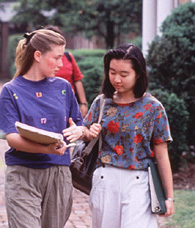|
ASIAN AMERICAN
|
CONTACT US
|
ADVERTISING INFO
© 1996-2013 Asian Media Group Inc
No part of the contents of this site may be reproduced without prior written permission.
GOLDSEA | ASIAMS.NET | ASIAN AMERICAN PARENTING
PRIVATE SCHOOL BOOM
PAGE 3 OF 4

Tomimatsu says the hardest things about adapting to Foxcroft are learning to speak English and dealing with homesickness. If she has a problem, she seeks out her friends or her American chemistry teacher who serves as her advisor. When things get really tough, she concentrates on her purpose for being there: speaking English and soaking up American culture.
Though she insists on speaking English, she usually mingles with foreign students because they share the same experiences of being overseas. Her closest friends are from Japan, Taiwan and Corea. Life without other Asian students, she says, "would be very, very hard for me."
For Tomimatsu it is frustratingly difficult to get involved with American students because she doesn't speak English "100%". "Orientals can laugh at my jokes," and are interested in what she has to say. She finds intramural sports to be the most helpful ice-breaker into the American way of life, and gleefully describes her winning debut performance in field hockey.
Vastly different from Tomimatsu's experience at Foxcroft is that of Carol Paik, a 17-year-old Corean American who's been there 18 months. Paik finds the lifestyle easier because she does speak English 100% and, as a five-day boarder, gets to go home on weekends.
[CONTINUED BELOW]
Paik had previously attended public schools in Bethesda, Maryland and
transferred because unruly classmates and disinterested faculty hindered
her studies. Like Tomimatsu Paik chose Foxcroft because she liked the
environment: the people, the scenery, a dorm layout that seemed conducive
to making friends. She also appreciates intramural sports as an antidote to
stress and social tension.
Unlike Tomimatsu it's easier for her to relate to American-born students.
Most of her friends are white, a couple are black. Paik has no
problem mingling, and says her biggest challenge is finding free,
unstructured time. She's learning more at boarding school, but still looks
forward to getaway weekends at the mall.
Asian students tend to put her off because they constantly stick together. In
particular, Corean students have made her uncomfortable by addressing
her in Corean, a language she understands but is not fluent in. Last year she
roomed with a Corean national who was personally offended when Paik
decided to broaden her social horizons. Other Coreans seemed to waste of
lot of time deciding who can do what, says Paik.
The wide culture gap has more adversely affected Patra Shovityakool, an
18-year-old Thai national who has attended the Wyoming Seminary since
last September. Before Wyoming she spent the summer session and her
junior year at two Connecticut prep schools and divided her sophomore year
in California between a public school and a Catholic school. Until her
sophomore year, she attended private school in Thailand.
She "learned not to trust people," after her necklace and other personal
items were stolen in all of her first three boarding schools. What's more,
different sexual mores and social values have convinced her not to recommend the
experience to other Thai girls of her age. "When they come here they have
too much freedom," she explains. "They just don't know how to handle it.
They just run wild."
As with Paik, Shovityakool transferred to a boarding school because of bad
relationships with teachers and students. Overcrowding, fights and drugs at
both the public and Catholic schools as well as faculty disinterest are among
the factors she cites. She chose the Connecticut schools because friends of
hers went there and they were recommended by the Education Department
in Thailand.
Shovityakool expected to find a good education in Connecticut, and was
disappointed by the faculty's unhelpfulness and their force-feeding of team
sports. Thailand's Education Department recommended Wyoming Seminary
as an alternative, and when Shovityakool visited in the summer, she was
impressed by the curriculum, the school's proximity to town life, and the
fact that international students are not segregated from the rest of the
student body.
PAGE 4
| In particular, Corean students have made her uncomfortable by addressing her in Corean, a language she understands but is not fluent in. |
